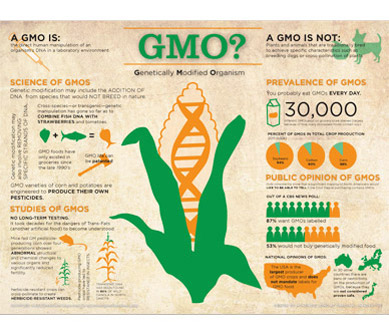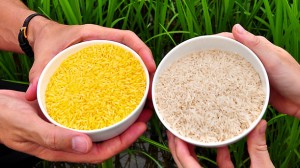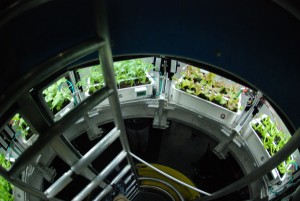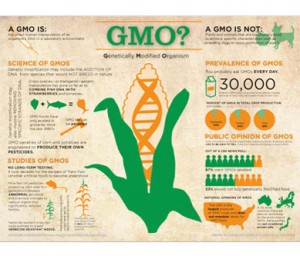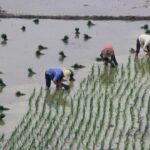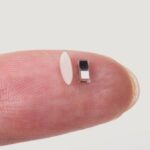I have read so many diatribes about GMO foods, the Frankenfoods that Monsanto has released into the world of agribusiness, that I am more than sated from the consumption. But the misinformation that is being printed needs to be addressed.
Are GMO foods safe to eat?
Well here is the science to help you understand what are the consequences of eating stuff that is genetically modified, not by selective breeding, but by gene transcription.
To create a GMO product a piece of DNA from one plant may be inserted into another. The reason agri-scientists do this is to pass along a favorable trait in one organism to help another. So Monsanto, for one, creates drought-resistant corn so that the crop can be grown in semi-desert climates or in areas where precipitation is highly variable. Or Swiss and German scientists create golden rice with beta-carotene to solve the problem of child blindness in the Developing World. The delivery method for gene insertion to alter the DNA varies. It can be done by gene splicing. It can be done by delivering a packet of genetic material through an adenovirus.
Once the new genetic information is inserted into the DNA within a plant cell it gets transcribed into RNA and the RNA encodes for a protein which then delivers the message of the new genetic information throughout the plant altering it permanently.
So when you ingest an altered plant that has received new genetic information how can it harm you? If the protein or RNA is directly ingested by you then it might be picked up by bacteria in your gut. After all when we eat plants and animals every day we ingest DNA from them. But not very much because we cook the food we eat, and what we don’t cook our digestive system degrades to pretty much render it as harmless. So it becomes pretty difficult to become genetically altered in any way by the food you eat.
What about the potential for allergic reactions? That’s a real concern and the agri-scientists spend a great deal of time in studying this potential problem. They test the protein in animal studies to ensure common allergens and allergic reactions are screened. And in the end it turns out that whether we modify a plant by selective breeding or by genetic means, the results are the same. There is no higher risk when the two are compared.
So where is there cause for concern?
In the fields where the crops are grown is the answer. Growing a GMO crop in the great outdoors is what farmers do. This is an environment with no controls. There is bacteria in the soil. There are insects that eat crops. Can they pick up the modified genetic information? Undoubtedly yes.
When you think of genetically modified corn that is resistant to a fungus or to a pesticide you can then begin to see the potential of spreading resistance beyond the individual plant species to others. Bacteria could become conditioned to living with the altered genetic information. Herbicidal information designed to stop insects from destroying crops could eventually condition insects to survive ingesting the new genetic information. Even weeds and neighboring crops can pick up the genetic information transmitted through interlocking root systems and then pass along the genetic information to the insects that feed on them.
So farmers have learned that they need to isolate GMO crops when growing them to limit the potential for passing along genetic characteristics to unintended hosts. But even then it is impossible to completely segregate GMO crops in today’s world of agriculture. You might better be able to do this under glass in greenhouse agriculture. And that makes space agriculture a great place for GMO. A closed environment that completely isolates what is grown such as a Deep Space habitat, or a lunar or Martian colony may be where we will see the agri-science of GMO foods expand.
To learn more you can read an article that appeared in the September 16, 2013, Critical Reviews in Biotechnology, called “An overview of the last 10 years of genetically engineered crop safety research.” As for the right to know when you are eating GMO foods – it would seem to me to be of no consequence either for the producers or the consumers in light of the fact that consuming GMO products is no worse than consuming any food we produce by other means. So why not?
